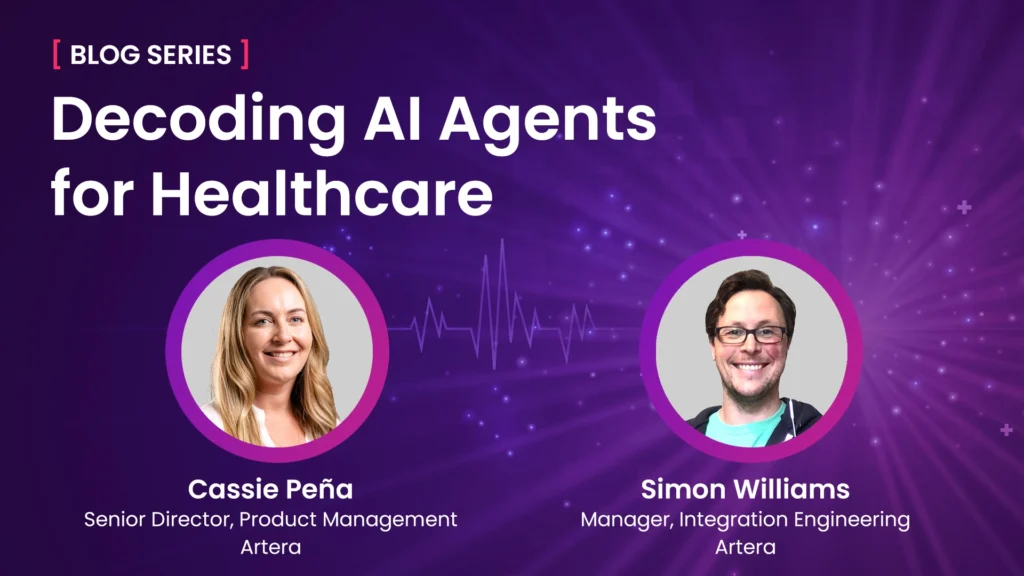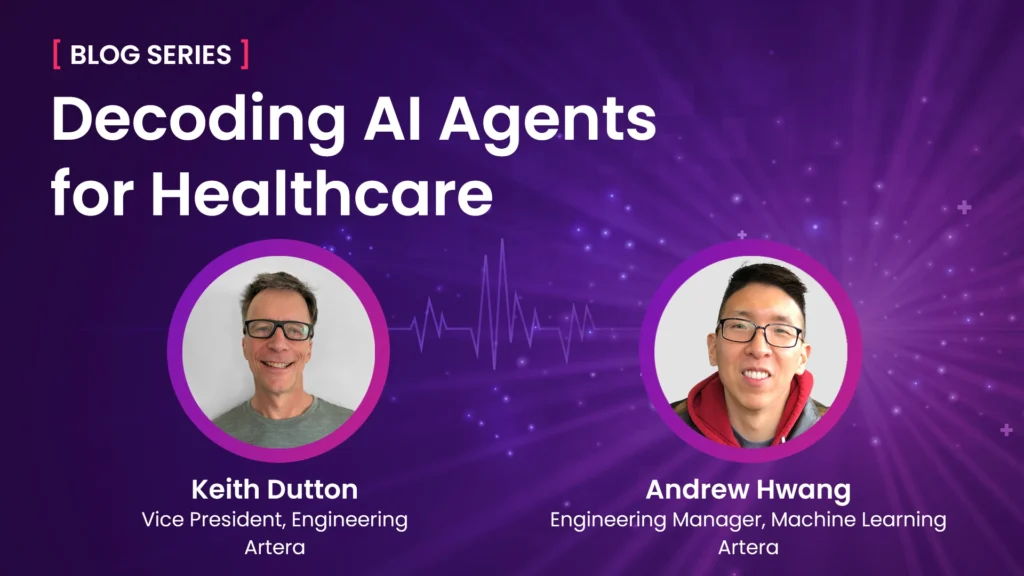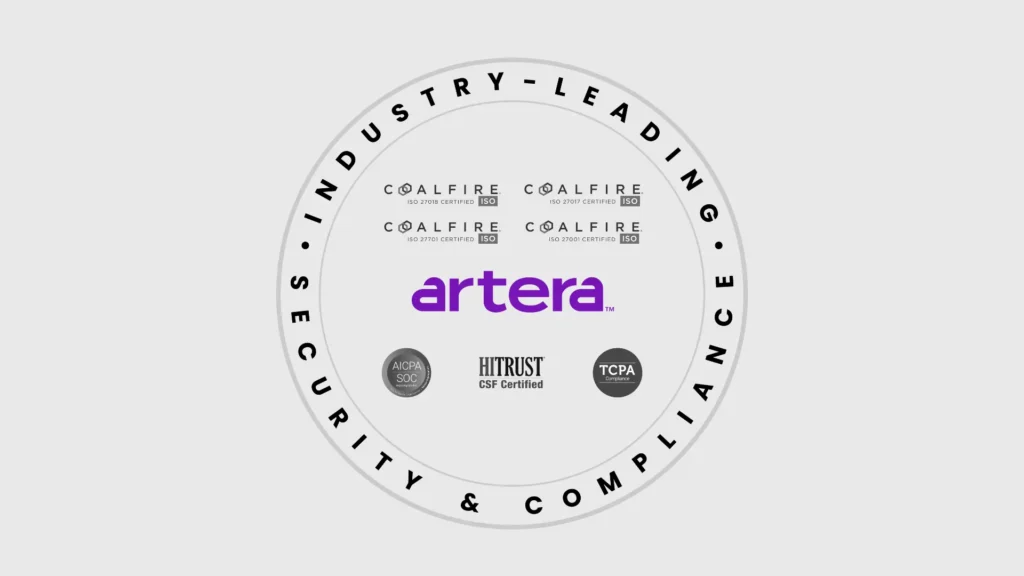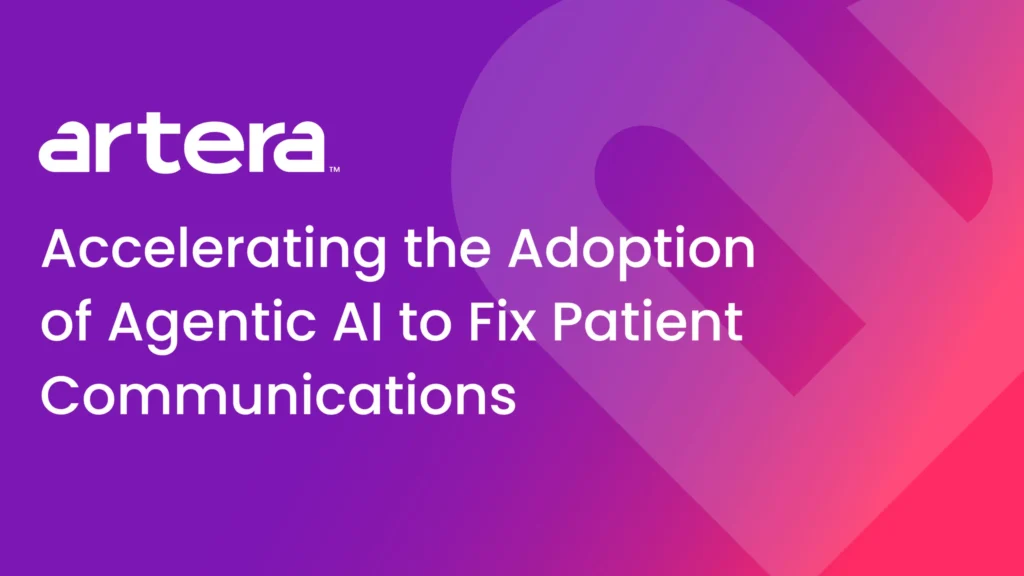By: Cassie Pena, Senior Director, Product Management, and Simon Williams, Manager, Integration Engineering
Organizations are quickly adopting AI agents for healthcare to streamline operations, reduce staff workload and enhance the patient experience. But here’s the thing: the success of these tools comes down to one big factor: how well they integrate with your existing systems. Even the smartest AI is only as good as its ability to connect to your data and workflows. Without seamless integration, you risk expensive technology that doesn’t fully deliver.
The tricky part? Every vendor claims to offer “deep EHR integration” or “seamless connectivity.” For healthcare IT leaders, the challenge is cutting through the buzzwords to figure out which partner can deliver real results. Let’s break down what to look for when assessing an AI agent partner based on actual integration depth and scope.
Integration Capabilities Impact AI Agent Success
AI agents need access to the right data to truly be effective. Think EHRs, scheduling tools, and billing platforms: these are the core systems running patient care. Real-time data access allows AI agents to make smart decisions based on current patient information, schedules, and protocols. They also need to communicate back, updating records, booking appointments, and triggering workflows.
If the integration isn’t solid, you’re left with fragmented data and manual workarounds, which defeats the purpose of automation. To get the most out of AI, you need a partner who can connect all the dots seamlessly.
Evaluating Integration Scope and Diversity
Health system leaders must thoroughly assess and understand the integration capabilities available from a potential agentic AI partner. When evaluating vendors, healthcare organizations should look beyond broad integration claims and marketing to truly grasp the depth of their offerings.
Effective integration demands careful consideration of several critical dimensions, including experience and distribution, the breadth and diversity of EHR integration types and overarching ecosystem strategies.
Below are several topics and questions to consider when evaluating an agentic AI vendor’s integration capabilities across these dimensions:
Customer Volume and EHR Integration Diversity
Many vendors can showcase one or two basic integrations, but scaling AI agents across healthcare teams and environments demands proven expertise with multiple data sources. It’s important to seek out vendors who can demonstrate experience with multiple customers using your EHR platform, the ability to handle diverse data feed types beyond basic scheduling, and production workflows that actively process patient interactions.
Potential Question to Ask Vendors During Evaluation:
“How many customers have you successfully integrated with our specific EHR system, and across how many different data feeds / sources?”
The Artera Difference → At Artera, we maintain a comprehensive internal repository of EHR data feeds and integration types, which enables efficient knowledge transfer across teams and allows us to quickly reference EHR integration setups for customer support and shared learning.
Diverse Integration Methods
EHR integration isn’t a one-size-fits-all solution. It’s essential to partner with a vendor who has a thorough understanding of various integration methods and can guide your team toward the approach that best aligns with your needs. Choosing a vendor limited to a single integration method could restrict your options and hinder your success.
For example, static file uploads may be suitable for infrequently changing data, such as FAQ content, but dynamic patient information requires real-time API connectivity. Vendors should demonstrate understanding of when to use different integration approaches and the operational implications of each choice.
Question to ask:
“Do you support multiple integration pathways, and can you give examples of when each was used successfully? How do you determine the right approach for different data types?”
The Artera Difference →At Artera, our integrations extend across multiple data feeds and API endpoints. Our in-house integration engineering team supports the full spectrum of healthcare data exchange methods, including:
- HL7 messaging for real-time clinical data exchange
- Flat file for structured files like CSV, TXT or TSV
- FHIR APIs for modern, standards-based connectivity
- SFTP file transfers for batch data processing
- Custom development for unique organizational requirements
While these technical methods are crucial for data exchange, the next-generation challenge is making that data actionable for AI agents. To reliably enable core agent functions—such as scheduling appointments, updating patient records, or processing prescription refills—the industry is adopting Model Context Protocol (MCP) as a best practice. MCP acts as a standardized “translation” layer, allowing Large Language Models (LLMs) to speak fluently with your existing clinical and operational systems. This open standard ensures that the AI agent’s interactions and transactions are consistent, trustworthy, and scalable across all your healthcare workflows.
For an even deeper understanding of MCP, read this blog from Artera alum and technical advisor Ashu Agte.
Workflow Support
Beyond a strong ecosystem, assess the complexity of workflows the vendor can handle, and their ability to support diverse teams and functions across an entire health system. Does the vendor’s solution only assist with scheduling (i.e., just in the call center), or can it manage a broader range of healthcare workflows across different teams?
The more comprehensive the workflows a vendor can support, the better equipped they are to scale alongside your organization’s evolving needs across departments and teams.
Questions to ask:
“What use cases do you support along the patient journey? Do you solve for one workflow, or can you expand to more complex use cases?”
The Artera Difference →At Artera, we work with customers across various areas and departments, including patient access and intake, value-based care, and chronic condition management teams. Our flexible use cases and workflow solutions allow us to scale and adapt to meet the unique needs of your organization. While some AI agent vendors focus on single-use cases like reducing call volume, Artera’s integration engine supports comprehensive patient journey workflows:
- Patient demographics and appointment management for personalized interactions
- Scheduling APIs for real-time appointment booking and modifications
- Referral management to reduce leakage and improve care coordination
- Post-discharge follow-up to ensure continuity of care
- Recall and preventive care campaigns for population health management
- And more…
Ecosystem & Partnerships
An AI agent’s value multiplies when it can interact with your broader tech ecosystem. Vendors with established marketplace partnerships can unlock new workflows faster than those building relationships from scratch.
Question to ask:
“What existing partnerships / contracts do you have in place? How quickly can you enable integrations with our other technology vendors?
The Artera Difference → Beyond EHR integration, Artera’s Marketplace provides pre-built connections to 50+ digital health vendors across the care continuum. These established partnerships enable AI agents to access data and trigger actions across:
- Revenue cycle management platforms for billing and payment workflows
- Patient engagement tools for unified communication experiences
- Population health solutions for comprehensive care management
- Telehealth platforms for virtual care coordination
- Given the established partnerships we have with other vendors, we can unlock more workflows faster for our customers.
What Questions Should You Ask When Evaluating Agentic AI Partners for Healthcare?
Here’s a quick list of questions to guide your conversations with potential agentic AI partners:
| Technical Capabilities | – How many EHR systems have you integrated with in production? – What’s the average number of data feeds you connect to per EHR implementation? – Do you have in-house integration engineering, or do you rely on third-party bridge vendors? – Which integration methods do you support (HL7, FHIR, API, SFTP)? – How do you handle real-time data synchronization between the AI agent and the EHR? – How do you manage data mapping and normalization between different EHR systems? – If our EHR APIs have rate limits or downtime, how does your system handle it? |
| Operational Experience | – How many healthcare customers are you currently supporting? – What workflows can you support across the entire patient journey? – How do you handle ongoing integration maintenance and updates? – What level of IT resource commitment do you require from our team? |
| Partnership Network | – Which third-party healthcare vendors do you currently integrate with? – Do you have existing partnership agreements in place? If not, how long would it take to get contracts in place? – Do you have the infrastructure and platform set up to support a true marketplace? – How do you prioritize new integration development? – Can you demonstrate workflow continuity across multiple departments? |
What Are the Hidden Costs of Poor Integration?
Choosing an AI agent vendor with insufficient integration depth can result in serious downsides:
First, custom development expenses quickly accumulate when vendors lack pre-built connectors for your existing systems. Second, operational overhead can increase significantly, as staff must manually transfer data between disconnected platforms, wasting valuable time and resources. Third, scalability limitations emerge, as vendors may struggle to adapt their solutions to your organization’s evolving growth and changing needs.
Perhaps most importantly, weak integration prevents AI agents from accessing the full context required for smart decision-making. This directly reduces their effectiveness and hinders user adoption, undermining the very purpose of implementing AI.
Artera’s Integration Advantage
With over 10 years of healthcare-specific integration experience, Artera brings unmatched expertise to the AI agent space. We’ve supported 1,000+ healthcare organizations with EHR integrations across a variety of workflows, giving us the knowledge and tools to deliver robust, scalable solutions. For more information on our integrations, click here.
Making the Right Choice for Long-term Success
Picking the right AI agent partner starts with understanding your goals. What challenges are you trying to solve? What future needs do you anticipate? Your vendor should not only address today’s issues but also scale with your growth.
As you evaluate potential partners, ask yourself one critical question: “Can this vendor truly support my organization’s long-term success?” If the answer is yes, you’re on the right track.
Today’s healthcare market is saturated with AI agent solutions, making vendor evaluation difficult for healthcare providers amidst similar claims and significant costs.
To simplify your evaluation, we’ve identified the top five factors that distinguish Artera’s AI agents today. Whether you’re new to AI agents or well into your research for a partner, we hope this distillation proves valuable.
Artera’s blog posts and press releases are for informational purposes only and are not legal or business advice. Artera assumes no responsibility for the accuracy, completeness, or timeliness of blogs and non-legally required press releases. Claims for damages arising from decisions based on this release are expressly disclaimed, to the extent permitted by law.



